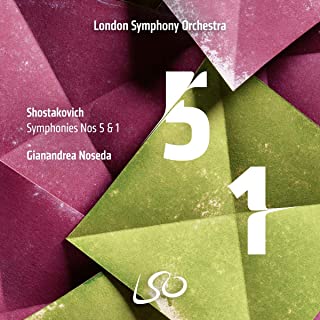
ESSENTIAL RECORDINGS

Gianandrea Noseda and the London Symphony Orchestra launch a cycle of the complete Shostakovich symphonies with one of the 20th Century's most iconic artistic statements. Few pieces of classical music have been the subject of so much debate and discussion as the Fifth Symphony of Dmitri Shostakovich. Following the 'justified criticism' of his opera Lady Macbeth of Mtsensk it marked a turning point in the composer's career, after which he balanced an even more precarious position as an artist under Stalin's brutal regime. {LSOLive}
The Fifth Symphony of Dmitri Shostakovich certainly is one of the 20th Century's most iconic music statements. In my opinion, no other orchestral work captures the spirit of an era, the soul of a nation, the unease of a composer, as deeply as it does, especially in context with the late 1930s when it was composed. There is a profoundly wistful character to this symphony that is hard to shake, and that stays with you long after audition. For one, the sharp contrasts in the first movement alone between foreboding military march elements and beautifully lyrical melodies, brilliantly executed by Shostakovich, hints at the paranoiac consciousness gripping the Soviet Union at the time. Conductor Gianandrea Noseda and the members of the London Symphony Orchestra well project this dual atmosphere throughout the first movement and really capture the enigmatic feel of the final two minutes. Listen to the effect the strings pull off at the 16:06 mark. Magically befitting the music.
And what can one say about the deeply expressive Largo movement of this symphony. Obviously those who dislike all 20th century music haven't heard it. Apparently, many people who attended this symphony's première were moved to tears by the onset of strong emotions during this movement. Noseda's pacing and dynamic control is very effective here, and from the 11:00 point on again the string players "get" the music's intent and really drive home that uplifting mood shift at the 11:43 mark. Whatever whiffs of optimism were present within the opening movement are quickly evaporated at the brutal onslaught of the final movement. This is the movement that has caused so much controversy over the last 80 years. Are the powerful punctuated chords at the end actual representations of victory or is it Shostakovich's way of flipping the authorities a sardonic finger and capping the symphony with a faux-triumph? Great audio capture of the harp passage at the 7:43 mark that leads to the aptly ominous snare drum that ushers in the coda. Gianandrea Noseda leads the orchestra forward here at a finely judged tempo (not ludicrously slow like some conductors have adopted recently) and the release of pent-up energy near the end is well done. The strings really dig into that ostinato note hammering in the massive repeated orchestral chords that lead to the finish, all of this underpinned by powerful timpani blows pummeling the message home.
Jean-Yves Duperron - June 2018